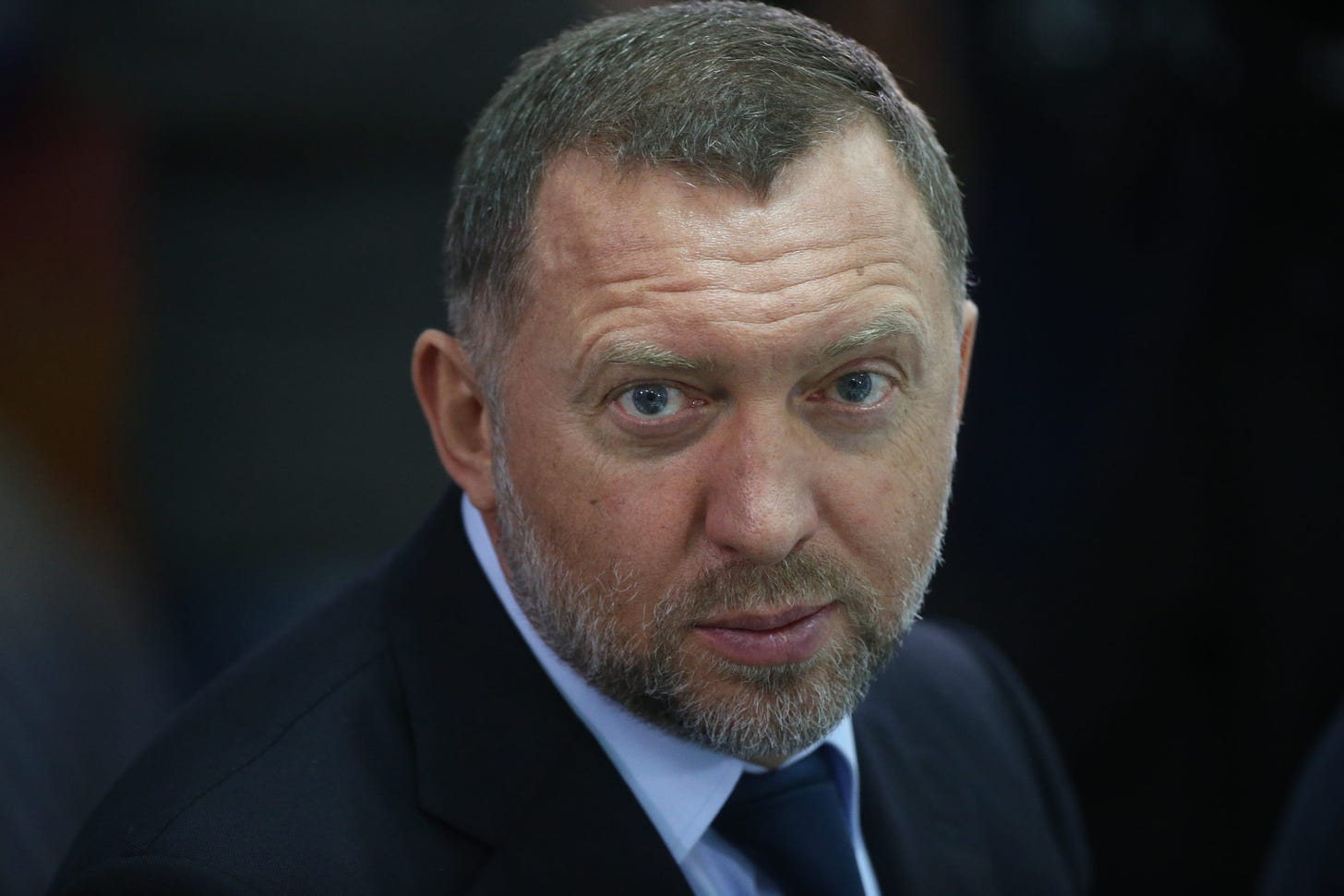What the Republican Split on the Deripaska Sanctions Vote Reveals
Why did some senators known to be hawkish on Russia refuse to join Democrats on a key measure?

Lost amid the shutdown drama is that Congress is actually in session and holding votes this week. And one vote in particular revealed an important fissure within the Republican Party: whether or not to maintain sanctions against Russian oligarch Oleg Deripaska.
Russia has an autocratic state and no rule of law, so if the boss wants something, the boss gets it. If the boss wants you to send some mercenaries to Syria for him, as Putin asked oligarch Yevgeny Prigozhin to do, you do it. If he asks you to help interfere in American elections, as he asked Deripaska to do -- well, he’s the only reason you’re a billionaire and not in jail, so what can you say?
In 2006, Deripaska was reportedly denied an entry visa to the United States on suspicion of ties to organized crime and possible money laundering. Later, Deripaska, who built part of his business empire in Ukraine, allegedly worked with former Trump campaign chairman Paul Manafort to influence politics there at Putin’s behest. Deripaska has denied those allegations.
In April, the Treasury Department hit Deripaska with sanctions for aiding election interference, in addition to “money laundering, extortion and ordering the murder of a businessman.” In addition to his personal assets, the Treasury Department sanctioned his companies -- EN+, Rusal, and JSC EuroSibEnergo.
Last month, Treasury’s Office of Foreign Assets Control notified Congress that, thanks to corporate governance reforms, the three Deripaska companies would be removed from sanctions lists. Per the original legislation under which Deripaska was sanctioned, Congress gets to review any decision to delist sanctioned entities.
When the measure came up in the Senate to keep Deripaska’s companies under sanctions, Foreign Relations Committee Chairman Jim Risch called it a political maneuver aimed at “nothing but to embarrass the president.” Other Republican senators echoed those sentiments, but the defection of 11 Senate Republicans and 136 House Republicans demonstrated that. Deripaska was still a problem worthy of addressing; embarrassing the president is merely an unintended side effect.
The Democrats needed a supermajority in the Senate so the measure failed. Some of the Republicans who crossed the aisle explained that the deal between the companies and the Treasury Department didn’t go far enough. Senator Susan Collins tweeted: “He still would maintain significant control given his ties to Putin.”
Senator Josh Hawley summed it up: “I think he’s a bad a guy and he’s still in working control.”
Senator Marco Rubio was unimpressed with the distance allowed between Deripaska and his companies: "For all intents and purposes between his shares, the independent shares that the Russian state-owned bank control and various other individual shareholders, I still think he retains operational control. So they’re going to have to do better.”
Some of the senators who voted to lift the sanctions were a surprise. Senator Richard Burr, who is chairman of the Intelligence Committee and who has worked admiraby alongside Democrat Mark Warner on the Intel Committtee’s investigation into the 2016 election, released a statement with Warener last month that vowed only to “continue monitoring these sanctions’ effects, and to hold accountable those who would violate them.” Warner voted against lifting the sanctions.
There’s been no greater proponent of election security and modernization in Congress than Republican James Lankford, who spent much of 2018 pushing the issue with Senator Amy Klobuchar. Although their bill was never passed, it was strange to see the author of the Secure Elections Act voting to ease sanctions on one of the architects of election interference. In a statement on Twitter, Lankford mused, “When a sanctioned organization makes structural changes to remove sanctioned individuals from having an outsized voice in its operations, it is not irrational to reconsider sanctions on the organization.”
Senate Banking Committee Chairman Mike Crapo dug himself into an even deeper hole: “Sanctions are designed to change behavior. What this has accomplished is that.” The original sanctions bill was called the Countering America’s Adversaries Through Sanctions Act, but it’s not exactly clear how these sanctions have accomplished "countering America’s adversaries." The only effect they seem to have had is forcing Deripaska to reorganize his companies – a meaningless formality in Russia. Worse, by placing state power between Deripaska and his companies, the reorganization may have made him more reliant on corruption to manage his wealth - rather than less.
Perhaps the most notable non-defector was Senator Mitt Romney, who famously identified Russia as America’s greatest geopolitical foe, and whose fiery op-ed in the Washington Post earlier this month appeared to signal a willingness to break with the administration. What changed?
None among Crapo, Lankford, and Romney responded to a request for comment.
The Treasury Department and the Republican non-defectors are quick to point out that Deripaska himself remains under sanction. That’s not nothing. But blaming Democrats for trying to score political points and hiding behind that to avoid a vote that might irk the administration is a bad start to the session.




